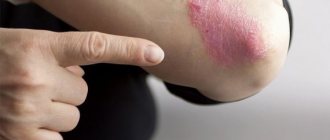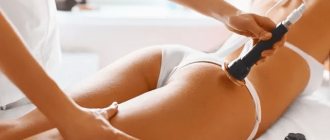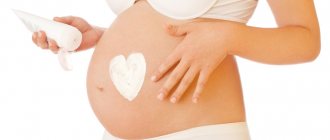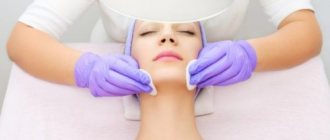Pregnancy is a period when many changes occur in a woman’s body, and chronic diseases also worsen. This includes atopic dermatitis. Considering that this disease is more common in women, there is a risk of recurrence during pregnancy. Moreover, it is quite possible that the disease had not manifested itself in any way before.
Why does atopic dermatitis develop during pregnancy?
The diagnosis of “atopic dermatitis” is typical not only for pregnant women. Anyone can experience it, but more often the disease manifests itself in childhood. The reason is heredity - if at least one of the parents is atopic, then the risk of encountering dermatitis in the child increases. The first signs of the disease may appear in adulthood.
Atopic dermatitis often occurs for the first time in pregnant women. Before this, the woman may not have encountered such a disease. The reason is associated with increased production of cortisol, a hormone that plays an important role in fetal development and is also responsible for the formation of allergic reactions.
The exacerbation is also due to a decrease in immunity, which is necessary to ensure that the mother’s body does not reject the fetus. This explains the development of atopic dermatitis during pregnancy. The risk is especially high if a woman had such a diagnosis or a tendency to allergies before conception. Provoking factors also include:
- excessive psycho-emotional stress;
- consumption of allergenic foods;
- unfavorable environmental conditions;
- chronic diseases of the digestive system;
- endocrine disorders;
- hormonal changes in the body of pregnant women.
How to get rid of dry skin during pregnancy
Dry skin during pregnancy can be a temporary phenomenon, but it can also serve as a symptom of endocrine disorders, so it cannot be completely ignored.
Recommended
- Normalization of drinking regime . Only together with an obstetrician-gynecologist, to exclude swelling and dropsy of pregnancy.
- Consultation with an endocrinologist with a mandatory blood test for hormones to rule out hypothyroidism or diabetes during pregnancy.
- Replacing/selecting a cleanser with a more gentle one (milk, non-foaming gel).
- Selection of care products : daily use of a serum containing micronized hyaluronic acid, on top of which a nourishing, regenerating cream is applied.
How does the disease manifest during pregnancy?
The disease is quite easy to recognize by severe itching and red rashes that appear on the stomach, knees, elbows, chest and neck. When active, the rash looks like small blisters with liquid contents. When they burst, areas of weeping appear on the skin, which then dry out and peel.
Scratching causes the skin to thicken and become rough. This phenomenon is called lichenification. The effect on the fetus of atopic dermatitis during pregnancy is minimal. The disease brings more discomfort to the woman herself, without interfering with the development of the child. Consequences can occur after birth, since the tendency to atopy is inherited. In a child, it can manifest itself not only in the form of dermatitis, but also in the form of bronchial asthma or hay fever.
Experts' opinion
The conducted clinical study proves the high efficiency, safety and tolerability of the product for daily skin care of children with mild and moderate forms of atopic dermatitis and during remission, accompanied by a decrease in the quality of life of patients. As a result of therapy, a decrease in the activity of the inflammatory process, a decrease in dryness, itching and flaking was noted.
Researchers from the Vertex company have proven that as a result of using La-Cri cream for sensitive skin, itching and irritation are significantly reduced, and redness goes away. The cream carefully cares for the skin and perfectly moisturizes it.
Based on the results of a clinical study, the information “Recommended by the St. Petersburg Branch of the Union of Pediatricians of Russia” is placed on product packaging.
Sources:
- I.I. Ryumina, V.V. Zubkov, Newborn skin care, Healthy Child magazine, 2017
- Habiff Thomas P., Clinical Dermatology. Acne-like and papulosquamous dermatoses, publishing house: MEDpress-inform, 2014
- Churolinov Petr, Herbal medicine in dermatology and cosmetics, Medicine and Physical Education Publishing House, 1979
Photos of eczema
Photo album on the diseaseForms and stages of atopic dermatitis
The critical periods of pregnancy are considered to be the 1st and 3rd trimester. During this period, atopic dermatitis can be severe. In other cases, everything goes smoothly.
Treatment of atopic dermatitis during pregnancy depends on the severity:
- Light form. The rashes are mild, accompanied by swelling, and have a pinkish tint. There is no peeling; skin itching occurs periodically.
- Medium shape. All symptoms intensify, the rash spreads throughout the body: on the face, back, stomach, inner thighs. Another characteristic sign is darkening of the skin around the eyes.
- Severe form. Due to severe itching, there is a possibility of nervous breakdowns and sleep problems. The skin at the site of the rash becomes swollen, peels, and becomes covered with erosions and pustules.
Causes of dry skin during pregnancy
- Increased fluid requirement (up to 2 liters per day), i.e. just dehydration. Many people avoid drinking enough water for fear of swelling.
- Reduced activity of the sebaceous glands. Occurs due to increased activity of the hormone estrogen. And if the expectant mother’s skin was not initially prone to oiliness, then during pregnancy there is a high probability of dry skin.
- Development of hypothyroidism and mild forms of diabetes mellitus in pregnant women .
Correct and safe treatment
Treatment of atopic dermatitis in pregnant women is often difficult due to the ban on the use of medications. Even many ointments that can be used in adults without consequences are prohibited during pregnancy. But the PsorMak clinic uses an absolutely harmless and safe ointment. It contains only natural ingredients, without hormones that can affect the fetus.
Only experienced doctors know what to do if atopic dermatitis worsens during pregnancy. During this period, it is especially important not to self-medicate, since the health of the child depends on the health of the woman. The PsorMak clinic has developed a treatment regimen that takes into account all the features and risks that arise during pregnancy. You can make an appointment by filling out the form on the website, or call us at +7 (800) 500-49-16.
Examples of cosmetics
The main problem that arises when dealing with dry skin during pregnancy is the selection of not only effective, but also safe products for girls in an interesting position.
There are a number of ingredients that are strictly not recommended for use during pregnancy and lactation:
- Vitamin A (retinol palmitate, retinaldehyde, retinoic acid)
- Salicylic acid
- Benzoyl peroxide
List of approved drugs DermaQuest
Let's consider the main positions necessary to combat dry skin:
Cleansers
Cleansing milk for delicate skin is the optimal solution for combating dryness and dehydration of the skin during the cleansing stage.
- Light texture milky cleanser
- Natural composition without dyes or artificial flavors
- Effectively dissolves and removes impurities and makeup from the skin surface
- Does not break skin barriers, on the contrary, restores them with Jojoba, Shea and mango seed oils
- Relieves skin irritation
Contains antioxidants and moisturizing ingredients
After use, the skin feels clean and moisturized at the same time!
Facial cleansing gel, daily care – a delicate enzyme-based cleansing gel for all skin types: quickly removes makeup and impurities, can be used around the eyes.
- Does not contain aggressive surfactants, does not foam during use
- Gently cleanses the skin with plant enzymes
- Dissolves and removes makeup
- Restores and moisturizes the skin due to the content of Aloe and Vitamin E
Hypoallergenic and acid-free composition is suitable for all skin types and during pregnancy.
Moisturizing serums
Serum B5 moisturizing with hyaluronic acid is a universal, powerful moisturizing serum. Contains 40% hyaluronic acid, designed for dry and dehydrated skin of all types.
- 40% micronized hyaluronic acid
- Patented moisturizing complexes: Protective Moisturizer Complex and Moisturizing Phytoamine Biocomplex.
- Complexes that increase the synthesis of your own collagen and hyaluronic acid: Aktifirm TS and MDI Complex.
- Panthenol 5%
Serum B5 moisturizing mattifying for oily skin - moisturizing serum for oily/combination/problem skin with signs of dehydration.
- 20% micronized hyaluronic acid
- Lilac Lilac stem cells, AC.NETTM complex and Evermat TM - have a sebum-regulating effect, normalize the amount and composition of sebum. Act locally at the site of application.
Serums have a light transparent gel texture; use 2 times a day, morning and evening.
HOW TO MAKE AN APPOINTMENT at the PsorMak Institute for Healthy Skin
1. Click the button you see below -
Make an appointment
2. Fill in the fields in the form that appears. Be sure to check the correct phone number so that our specialist can reach you. After filling out, click on the “Submit” button.
3. Wait for our specialist to call. He will answer any of your questions and agree on the date and time of your visit to PsorMak.
The initial appointment includes:
- Visual examination , which will allow the specialist to get a general understanding of the condition of your skin and the pathology itself.
- Collecting anamnesis - finding out information about the development of the disease, living conditions, previous diseases, operations, injuries, chronic pathologies, allergic reactions, heredity, etc. Together with a general examination, this allows you to make a fairly accurate diagnosis and choose a method of treatment and/or prevention.
What to do if the skin of a pregnant woman’s abdomen is too dry?
Usually water has a beneficial effect on the skin, but if the skin of the abdomen becomes dry during pregnancy, then long baths or too hot showers will dry it out even more. Therefore, try to ensure that the contact of water with the skin is not too long. Frequent use of soap also dries out the skin of the abdomen - it removes natural fat from the surface of our body. If you feel that the soap causes discomfort, do not apply it directly to your stomach; ordinary water will be enough for hygiene. And for washing in general, use gels, foams or special gentle lotions that contain a moisturizer.








